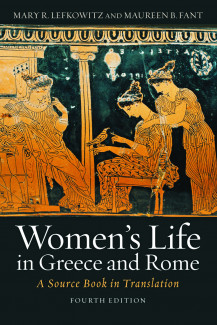
Johns Hopkins UniversityEst. 1876
America’s First Research University
“Really, is there anything new?”

That’s what plenty of people who should know better have been asking us since we started work on this new edition of Women’s Life in Greece and Rome, some forty years after the first. Is there ever! 
We’re also intrigued by the women intellectuals like Diogenes Laertius’ patroness, who “eagerly sought out his doctrines beyond all others,” or the empress Plotina, who was an enthusiastic Epicurean, and some of the other women who called themselves philosophers. Not to mention the women authors like Hestiaea (who wrote about the Iliad) and Pamphile, who wrote epitomes of histories and pornography, all of whose works have vanished without a trace.
When Mary was in Patmos this summer, she was delighted to see the original of one of the long inscriptions that we added to this new edition. It celebrates (in Greek) Vera, a priestess of Artemis, daughter of a doctor named Glaucias. Her father chose to honor her for her presiding over a sacrifice of embryos of newly slain goats. One wonders why Glaucias chose to give her a Latin name, and spend what must have been a large sum to put up such a beautifully carved stone. Certainly it could have served an indirect advertisement for himself. But it also shows that in the Eastern Mediterranean the ancient religious cult practices were still being observed and ancient myths remembered.
Maureen loves to read the Latin tombstones in Italian provincial museums, and thus was deeply moved last year in Bologna by the dedication of a wet nurse to the little girl in her care who died. In Milan, she found a widow’s desperate lament of her ill treatment by her late husband’s relatives. She has also revised and expanded the collection for this new volume with new images that illustrate our main themes and the kinds of materials we’ve used, like inscriptions and papyri. She loves finding works of art that seem to have been made to illustrate one of our texts, such as the sarcophagus in the Louvre on which a mother nurses her baby as her philosopher husband looks on approvingly.
The takeaway? The search for these women, and what they can tell us of ancient life, has no end.
Mary R. Lefkowitz is the Andrew W. Mellon Professor in the Humanities, Emerita, at Wellesley College. She is the author of Women in Greek Myth and Lives of the Greek Poets. Maureen B. Fant studied classics and archaeology at the University of Michigan and is now a writer and editor living in Rome, Italy. The fourth edition of Women's Life in Greece and Rome: A Source Book in Translation, is available now.


